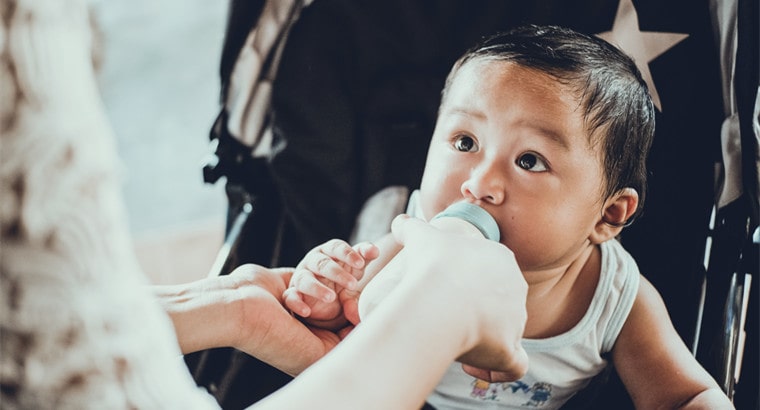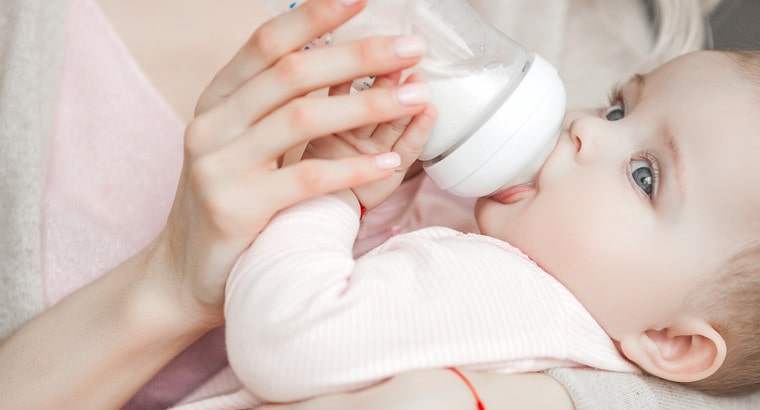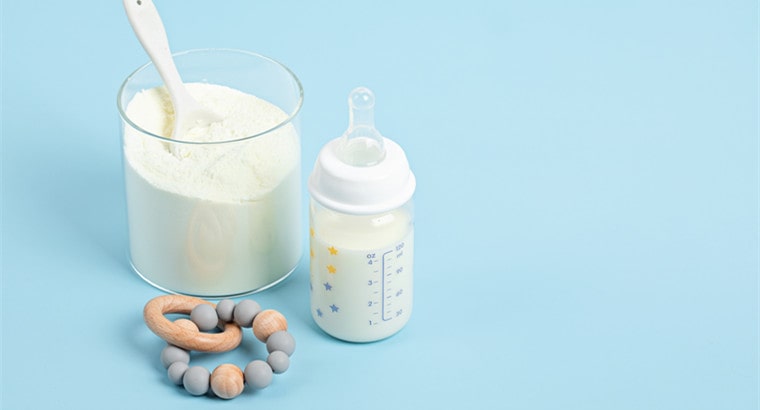When it comes to feeding your little one, there is nothing better than all-natural breast milk. However, not every woman can produce breast milk.
In that case, feeding your baby formula is a good alternative. It’s a completely safe option that contains the same vital minerals and nutrients as breast milk to keep your newborn healthy. But, the only catch is that it doesn’t have a very long shelf life.
So if you’re a new parent and wonder how long is formula good for, here is everything you need to know about this breast milk alternative.
How Long Is Formula Good For?

The 21st-century food industry is quite the juggernaut. Thanks to state-of-the-art technology, it’s now possible to preserve perishable food for months. What’s more, if you use proper storage methods, you can even extend their shelf life for several years.
Nevertheless, despite belonging to the processed category, baby formula has a surprisingly short shelf life. Health experts say that baby formula starts to spoil just 2 hours after preparation. However, its exact shelf life depends on several factors, like how you store it and whether or not your baby has already had some of it.
What’s more, health experts say this only applies to formulas you’ve already mixed. An unopened container of baby formula can last for several months to a year, depending on its expiration date.
However, the moment you crack the seal, you drastically cut the formula’s shelf-life. Therefore, after opening, you should use the formula within 30 days.
Also, be sure to store the formula powder in a dark, dry, and cool place like a food cabinet or pantry. Avoid storing it in your garage, vehicles, or the outdoors. Exposing the powder to moisture, high temperatures, or sunlight increases the risk of bacterial growth and contamination, which will compromise the safety of the powder.
Why Is Formula Only Good for an Hour?

Though formula’s 2-hour shelf life is a commonly accepted fact, have you ever wondered why it expires so quickly? To understand this, you first have to understand the immune system of newborn babies.
1. Why Are Babies So Vulnerable?
The first few months of life are critical for a newborn. Prior to birth, babies are encased in a completely sterile environment. They rely on the mother’s own immune system to fight off any dangerous microbes.
While this keeps them protected in utero, it leaves their own immune system very underdeveloped.
After birth, babies exist in a sterile environment and are immediately exposed to the millions upon millions of microbes in the outside world. However, these bacteria and viruses are fairly harmless.
Therefore, even a newborn’s weak immune system is still capable of handling most of these environmental contaminants.
However, the problem occurs when a newborn encounters a slightly more aggressive pathogen. Streptococcus, listeriosis, and e-Coli are some of the most common bacterial infections affecting newborns younger than a few weeks.
Most adult humans carry some form of these bacteria either on their skin or in one of their orifices. But because a fully developed immune system is so efficient, most of the bacteria end up being relatively harmless. In contrast, an infant’s cell-mediated immune response is not nearly as strong.
Consequently, if a mother passes a strep infection to her baby during birth, the bacteria could seriously harm the baby’s health. In severe cases, strep causes fever, pneumonia, and even sepsis. Even with the best treatments, 2 to 3 infants who contract serious strep group B end up losing their lives.
As grim as these statistics are, there is a silver lining. The mother passes on many of her antibodies to her infant. They stay active even after birth, helping protect the newborn from pathogens until their immunity develops.
Nevertheless, these antibodies aren’t a replacement for a fully functioning immune system, and they will fade a few weeks after birth.
2. Formula’s Short Shelf Life
When considering how vulnerable babies are, it would make more sense for manufacturers to make formula last longer. However, the powder’s quick expiration date has nothing to do with how its made.
As mentioned, the moment you mix your formula powder with liquid, you’re adding environmental contaminants to it. In the right conditions, bacteria will double in number every ten minutes, destroying the formula’s protective enzymes.
Therefore, health experts recommend you wait no longer than 2 hours to feed your child prepared formula.
The already used formula has an even shorter life span, lasting only about an hour. Giving your child the bottle allows their saliva to enter the formula itself.
Since the human mouth is a hotbed for bacteria, this causes bacterial backwash, wherein a small colony of relatively harmless pathogens enters the mix.
However, because there is no immune system to stop their growth, their numbers explode, contaminating the formula.
Therefore, if you pick up leftover formula to give to your child, you’re once again exposing them to a much stronger version of the bacteria their immune system is no longer able to subdue.
So, to keep your little one safe and healthy, you shouldn’t feed them leftover formula. If you still have some formula after the baby is done, throw it away immediately.
As wasteful as it seems, it’s a much better alternative to your baby catching a potentially life-threatening infection.
Formula Storage 101

So, to summarize, most health experts say that baby formula is only good for 2 hours after mixing. However, as previously flagged, this time frame isn’t exact.
Precisely how long your baby formula will last depends on several elements, like the previous contact with human saliva and storage.
In fact, how you store your formula is the biggest contributing factor to how long it will last.
Consequently, if you want to avoid dumping potentially good food, here is everything you should know about how storage affects baby formula.
1. How Long Is Formula Good for in the Fridge?
Everyone knows that storing food in the fridge is the best way to make it last longer.
This is because, like most organisms, germs require a very specific temperature range to grow.
Overall, most common bacteria prefer warmer environments, thriving best when the temperature ranges from 40 °F to 140 °F. Extreme heat is lethal for them, which is why health experts recommend cooking certain types of food to avoid getting sick.
However, colder environments aren’t nearly as detrimental for microbes. While it only takes 149 degrees °F of heat to thoroughly destroy all germs, temperatures would have to get 80 degrees below freezing for pathogens to die off.
Nevertheless, refrigerating food is still an effective way to preserve it because the cold slows bacterial growth.
In the case of baby formula, refrigeration can extend its shelf life for up to 24 hours. This is extremely convenient for nighttime feedings. You can simply premix a batch of formula, store it in the fridge, and then quickly reheat it when your baby gets hungry.
However, keep in mind that the 24-hour extension applies only to unused formulas. If you have some formula leftover after feeding, refrigerating it won’t preserve it.
Adding saliva to milk-based products accelerates bacterial growth, even in colder temperatures. Therefore, best stick to the same advice and throw any leftover formula right after feeding time ends.
2. How Long Is Formula Good for After Mixing?
Cracking the seal on your Holle formula allows pathogens to enter. However, the preservatives in the powder hinder their growth. But, the instant you add water to the mix, you create a nutrient-rich environment for bacteria to thrive.
The formula is comprised of cow milk proteins that have been altered to resemble human breast milk. Adding liquid to the powder activates the enzymes, allowing the bacteria to feed on them. What’s more, if you use warm water to prepare the mix, you’re actually giving the bacteria a helping hand since they multiply more quickly in warmer temperatures.
Consequently, health experts recommend you use the prepared formula within 2 hours. This applies to both powdered mixes and ready-to-feed bottles.
3. How Long Is Formula Good for at Room Temperature?
While refrigerating your formula extends its shelf life, leaving it out at room temperature can shorten it. During the summer, warmer temperatures can cause bacteria to grow much faster, especially if you leave the bottle in direct sunlight.
What’s more, certain brands already expire more quickly, lasting one hour instead of two. So, when picking your formula, it’s important to read the expiration date and study the labels carefully.
4. How Long Is a Formula Bottle Good For?
Another thing that can compromise the safety of the formula is the bottle you use. Most health experts recommend mixing the powder and liquid inside the bottle you’re going to use to feed your baby. While you can technically make a batch of formula to store in the fridge, mixing it in another container risks contamination.
Furthermore, be sure to use only sterilized bottles for your formula. Dirty bottles don’t just cut down prepared formula’s shelf life, but they can make the formula entirely undrinkable. Therefore, only mix the formula in a bottle you’ve thoroughly cleaned and give it to your child within 2 hours.
What Happens If a Baby Drinks Formula After 2 Hours?

Even the best of parents make mistakes. You’re tired, cranky, and the stress of caring for a needy newborn has completely scrambled your brain. With so many things going on at once, it’s easy to slip up and accidentally feed your baby formula that’s been sitting out for longer than 2 hours.
If this has happened to you, don’t panic. In the vast majority of cases, drinking old formula won’t affect your baby. While the risk of contracting foodborne illnesses is higher with 3-hour, or 4-hour old formula, it’s not a guarantee it will happen.
At most, the formula your baby consumes will just be slightly less nutritious because the enzymes have had longer to break down.
However, if your baby starts exhibiting symptoms of illness shortly after consuming the older formula, then that may be a cause for concern. As mentioned, a baby’s immune system is very weak.
Consequently, any foodborne illness they contract will impact them harder than they would an adult.
Therefore, if you’ve fed your little one expired formula, keep an eye out for the following symptoms.
• Vomiting — Like in adults, vomiting is the first sign of food poisoning in infants. A baby will start puking an hour to 24 hours after they’ve ingested the old formula. In most cases, the vomiting will stop on its own after the baby has expelled all the formula from its body.
• Diarrhea — Next to vomiting, diarrhea is another common symptom of drinking old formula. This will present as very runny, very acidic stools that can leave your little one with some serious diaper rashes. To avoid causing your infant more discomfort, be sure to change their nappies after each bowel movement. Moreover, contact your pediatrician if diarrhea lasts longer than a day or two.
• Fever — The first sign of a serious infection is a fever. An elevated body temperature means your baby’s immune response is actively trying to fight off a foreign invader. If this happens after you’ve given your baby old formula, take them to a medical professional immediately.
• Dehydration — Dehydration is hard to spot in adults, let alone infants. However, if your baby is vomiting and passing diarrhea, then there is a good chance they’re going to be losing a lot of water.
Therefore, make sure to pay close attention to the color of their skin and how frequently they pass urine. If they appear pale or urinate less than 3-4 times a day, it may be time to take them to the emergency room.
How to Store It: 7 tips

As evidenced, baby formula has a pretty short shelf life. However, while this makes sense from a safety standpoint, it’s very inconvenient. A lot of parents are stressed and trying to juggle work with taking care of their newborn. What’s more, babies are supposed to eat every 2-3 hours, which amounts to 8-12 times in 24 hours.
During the day, regular feedings aren’t quite so hard to pull off. However, at nighttime, making a fresh batch of formula can be a huge hassle. Fortunately, there are ways to make feeding the little one much easier. For one, the proper storage method can make the formula last longer and be much safer to consume.
So, to ensure your baby stays healthy and well-fed, here are the best formula storing and mixing tips to make feeding time easier.
1. Clean Your Hands Before Preparing the Bottle
The first thing to do before prepping the formula is to prepare yourself. Thoroughly wash your hands under a jet of warm water, making sure to clean between your fingers and up your elbows. Also, sterilize the work area where you’re going to mix the bottle. This will ensure no pathogens end up in the prepared formula.
2. Sanitize the Bottle
After your hands, the next thing you should thoroughly clean is the bottle. Because the bottle regularly comes into contact with a milk-based product and saliva, bacteria can grow on it pretty quickly.
Therefore, before adding formula to it, you need to take it apart and sterilize it with boiling water or a sterilization solution.
What’s more, avoid putting the bottle inside the sink, so it doesn’t get contaminated. Set the bottle on a clean towel to dry, and keep it away from other dishes.
3. Use Water from Safe Sources
Apart from making sure the powder is safe, you should also make sure the water you use to make formula is safe as well. Most parents prefer using bottled water for their formula because they believe it’s cleaner than tap water. However, this is a misconception.
In general, tap water in the US is considered safe for consumption. The Environmental Protection Agency, or the EPA for short, is currently responsible for overseeing the process of treating tap water. Tap water has to contain fewer than 90 contaminants to be considered legally safe to drink.
Of course, just how safe the tap water is will depend on the area you live in. The water supply in certain parts of the US has a higher exposure rate to toxins, like industrial pollutants and bacteria from agricultural runoff. Similarly, old pipes can cause heavy metals to bleed into the water supply and contaminate it.
Overall, your best bet is to carefully research your local tap water supply and how pure it is. If you’re uncertain about the water’s quality, go for bottled water. But be warned that bottled water is also susceptible to contamination.
Poor processing and bottling methods can contaminate bottled water with microplastics. These compounds contain endocrine-disrupting chemicals, which can cause inflammation. Prolonged exposure to microplastics can seriously damage the liver, kidneys, and intestines.
So once again, be sure to research bottled water brands, and choose the one you know is safe.
4. Boil the Water
If you aren’t certain about the quality of your water, play it safe. Boil the water for a good minute and let it cool before mixing the formula. This will not only kill off the bacteria but also take care of any other contaminants hiding in the liquid.
5. Refrigerate Formula Immediately If You Don’t Plan on Using It
In case you’re premixing a large batch of formula to use later, immediately put it in the fridge. Don’t let the formula stay out at room temp, especially if it’s summertime or if you live in warmer parts.
6. Avoid Freezing the Formula
Since storing formula in the fridge extends its shelf life, you may think it is a good idea to freeze it. However, this isn’t advisable. Liquids turn to ice at 0°F, and since it takes temperatures below 80°F to kill pathogens, this won’t extend the formula’s shelf life.
But freezing will alter the formula’s texture. It may even cause some of the enzymes to degrade, making it less nutritious.
7. Don’t Heat the Formula in the Microwave
Another important tip is to avoid heating the formula in the microwave. As convenient as it is to blast the bottle for a few seconds, it can actually be dangerous.
Microwaves unevenly heat the formula, causing ‘hot spots’ in the bottle. Drinking scalding formula can seriously burn your baby’s mouth and throat. Therefore, to warm up your formula, run it for a few minutes under hot water.










